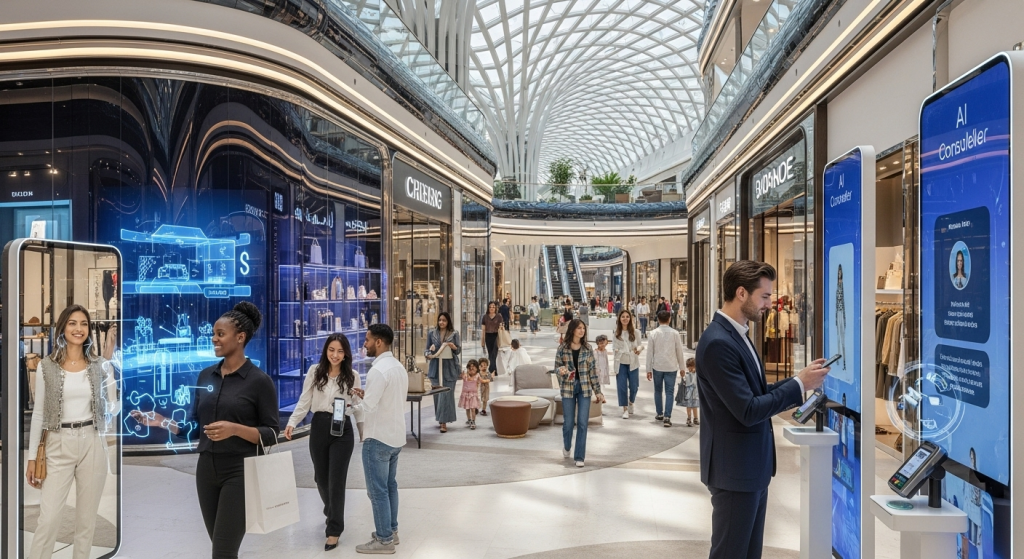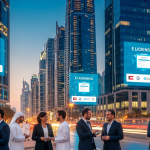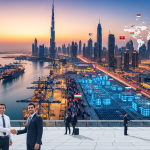Dubai’s Retail Sector Embraces Smart Technology in 2025
Dubai’s retail sector, long known as a global hub for luxury shopping and innovative commerce, is undergoing a significant transformation in 2025. With the integration of smart technologies, retailers in the emirate are redefining customer experiences, streamlining operations, and positioning themselves at the forefront of global retail trends. This development aligns with Dubai’s broader vision of becoming a smart city and a leader in digital innovation, as outlined in the Dubai Economic Agenda (D33), which aims to double the emirate’s economy by 2033.
From AI-driven personalization to contactless payment systems and immersive shopping experiences, the retail landscape in Dubai is leveraging cutting-edge tools to cater to a diverse and tech-savvy consumer base. This article explores the key trends, technologies, and opportunities shaping Dubai’s retail sector in 2025, providing actionable insights for investors, business owners, and industry professionals looking to capitalize on this dynamic market. For expert guidance on navigating these opportunities, consider exploring the resources at Persian Horizon, a trusted name in UAE business consultancy.
Key Drivers Behind the Retail Tech Revolution in Dubai
Dubai’s retail sector has always been a cornerstone of its economy, contributing significantly to non-oil GDP. The emirate’s strategic location, world-class infrastructure, and business-friendly environment have made it a magnet for international brands and retailers. In 2025, several factors are accelerating the adoption of smart technologies in this sector:
1. Government Support for Digital Transformation
The Dubai government has been a key enabler of technological innovation through initiatives like the Dubai Smart City project and the Dubai Blockchain Strategy. These programs encourage businesses to adopt digital tools, with a focus on enhancing efficiency and customer satisfaction. Retailers are benefiting from streamlined regulations and incentives that promote the use of AI, IoT, and other advanced technologies.
2. Changing Consumer Expectations
Today’s consumers in Dubai, a mix of locals, expatriates, and tourists, demand seamless and personalized shopping experiences. With a high penetration of smartphones and internet usage, customers expect retailers to offer digital solutions such as mobile apps, online shopping platforms, and in-store tech integrations. Retailers are responding by investing in tools that provide real-time data and tailored recommendations.
3. Competitive Market Dynamics
Dubai’s retail market is highly competitive, with iconic shopping destinations like The Dubai Mall, Mall of the Emirates, and countless free zone retail hubs vying for consumer attention. To stand out, businesses are turning to technology to differentiate their offerings, whether through interactive displays, virtual try-ons, or automated checkout systems.
Smart Technologies Transforming Dubai’s Retail Sector
The adoption of smart technologies in Dubai’s retail sector is not just a trend but a strategic necessity. Below are some of the most impactful innovations driving change in 2025:
AI and Machine Learning for Personalization
Artificial Intelligence (AI) is at the heart of retail innovation in Dubai. Retailers are using AI algorithms to analyze customer data, predict purchasing behavior, and offer personalized product recommendations. For instance, major retail chains in Dubai are deploying AI chatbots on their websites and apps to assist customers with queries, while in-store AI systems help staff provide tailored suggestions based on past purchases.
Moreover, machine learning enables inventory management by forecasting demand and reducing overstock or stockouts. This technology is particularly beneficial for luxury retailers in Dubai, where maintaining exclusivity and availability is critical. Businesses looking to integrate such solutions can benefit from specialized Investment Consulting Services to identify the right tech partners and funding opportunities.
Contactless Payments and Digital Wallets
The shift towards cashless transactions has gained momentum in Dubai, especially post-pandemic, with contactless payments becoming the norm. Retailers are adopting Near Field Communication (NFC) technology, QR codes, and mobile wallet integrations to facilitate quick and secure payments. This not only enhances customer convenience but also reduces transaction times, a crucial factor in high-traffic shopping areas.
The UAE Central Bank’s push for financial inclusion and digital payments has further supported this trend, with platforms like Apple Pay, Samsung Pay, and local solutions being widely accepted across Dubai’s retail outlets.
Augmented Reality (AR) for Immersive Experiences
Augmented Reality (AR) is revolutionizing the way customers interact with products in Dubai. Retailers, especially in the fashion and beauty sectors, are using AR to allow customers to virtually try on clothes, accessories, or makeup without physically touching items. For example, some stores in The Dubai Mall have installed AR mirrors that let shoppers see how an outfit looks on them by simply standing in front of the screen.
This technology not only enhances the shopping experience but also reduces returns and increases customer satisfaction. For businesses aiming to implement AR solutions, exploring the latest updates on the News section of Persian Horizon can provide valuable insights into market trends and vendor options.
IoT and Smart Shelves for Operational Efficiency
The Internet of Things (IoT) is making retail operations smarter in Dubai. Smart shelves equipped with sensors can monitor stock levels in real-time, alerting staff when items need restocking. This technology minimizes human error and ensures that popular products are always available, a key consideration during peak shopping seasons like the Dubai Shopping Festival.
IoT also extends to customer-facing applications, such as smart fitting rooms that suggest complementary items based on what a customer is trying on. These innovations are helping retailers optimize both backend operations and front-end engagement.
Opportunities for Investors and Businesses
The rapid adoption of smart technology in Dubai’s retail sector presents a wealth of opportunities for investors and entrepreneurs. The emirate’s retail market is projected to grow significantly in 2025, driven by increasing tourist footfall, a growing expatriate population, and rising disposable incomes. Below are some actionable avenues for involvement:
1. Investing in Retail Tech Startups
Dubai’s startup ecosystem is thriving, with numerous tech companies focusing on retail solutions. Investors can explore opportunities in AI, AR, and payment technology startups that are tailoring their offerings for the retail sector. Free zones like Dubai Internet City and Dubai Silicon Oasis are hubs for such innovation, offering tax benefits and networking opportunities.
2. Setting Up Tech-Enabled Retail Businesses
For entrepreneurs, launching a tech-enabled retail business in Dubai is a promising venture. Whether it’s an e-commerce platform with AR capabilities or a brick-and-mortar store with IoT integrations, the market is ripe for innovation. Navigating the setup process can be streamlined with expert Business Setup Services to ensure compliance with local regulations and licensing requirements.
3. Partnerships with Established Retailers
Technology providers and solution vendors can seek partnerships with established retail chains in Dubai. Collaborating on pilot projects for smart shelves, AI analytics, or digital payment systems can open doors to long-term contracts and scalability. For assistance in identifying potential partners, consider leveraging Business Sales Services to connect with the right stakeholders.
Challenges in Adopting Smart Retail Technologies
While the opportunities are vast, adopting smart technologies in Dubai’s retail sector comes with its share of challenges. High initial costs for tech implementation can be a barrier, especially for small and medium-sized enterprises (SMEs). Additionally, ensuring data privacy and cybersecurity is critical, given the sensitive nature of customer information handled by AI and IoT systems.
Retailers must also invest in staff training to handle new technologies effectively. Overcoming these hurdles requires strategic planning and, often, expert guidance. Resources like the Blog section on Persian Horizon offer in-depth articles and tips on managing such transitions in the UAE market.
Case Studies: Retailers Leading the Way in Dubai
Several retailers in Dubai are already setting benchmarks with their adoption of smart technologies. For instance, a leading luxury retailer in The Dubai Mall has implemented AR-based virtual try-ons, reporting a 20% increase in customer engagement. Similarly, a major supermarket chain has rolled out IoT-enabled smart shelves across its outlets, reducing stock discrepancies by 30%.
These success stories highlight the tangible benefits of tech adoption and serve as inspiration for other businesses. For those looking to acquire or invest in such innovative retail ventures, exploring Business Buying Services can provide access to promising opportunities in the market.
Future Outlook for Dubai’s Retail Sector
Looking ahead, Dubai’s retail sector is poised for continued growth and innovation in 2025 and beyond. The integration of smart technologies will likely deepen, with emerging trends like blockchain for supply chain transparency and robotics for in-store assistance gaining traction. The government’s commitment to fostering a digital economy, coupled with Dubai’s status as a global retail destination, ensures that the sector remains a hotspot for investment and business development.
For marketing professionals aiming to promote tech-driven retail solutions, specialized Sales and Advertising Services can help craft targeted campaigns to reach the right audience in Dubai. Additionally, for international investors or entrepreneurs seeking to establish a foothold in the emirate, Residency and Citizenship Services offer a pathway to long-term engagement with the market.
Conclusion
Dubai’s retail sector is at a pivotal moment in 2025, with smart technologies driving unprecedented change and growth. From AI personalization to IoT efficiencies, retailers are embracing tools that enhance customer experiences and operational performance. For investors, entrepreneurs, and business leaders, this presents a unique opportunity to be part of a dynamic and forward-thinking market. Comprehensive support and insights are available through Services offered by trusted consultancies, ensuring a smooth journey into Dubai’s retail landscape.
As the emirate continues to innovate, staying informed about the latest developments and leveraging expert resources will be key to success in this competitive sector. Dubai’s retail future is undoubtedly digital, and the time to act is now.
Source: Inspired by trends reported on Gulf News UAE (https://gulfnews.com/uae)








